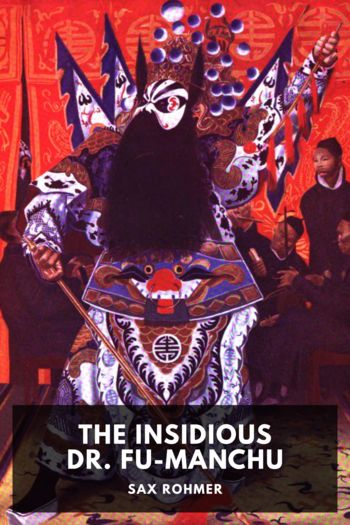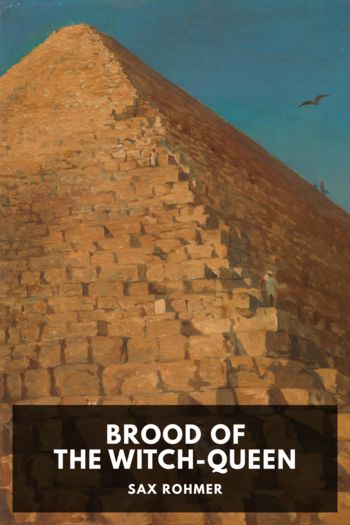The Insidious Dr. Fu-Manchu - Sax Rohmer (best finance books of all time .TXT) 📗

- Author: Sax Rohmer
Book online «The Insidious Dr. Fu-Manchu - Sax Rohmer (best finance books of all time .TXT) 📗». Author Sax Rohmer
Nayland Smith nodded.
“And we don’t know all,” he said. “We mark such and such a man as one alive to the Yellow Peril, and we warn him—if we have time. Perhaps he escapes; perhaps he does not. But what do we know, Petrie, of those others who may die every week by his murderous agency? We cannot know everyone who has read the riddle of China. I never see a report of someone found drowned, of an apparent suicide, of a sudden, though seemingly natural death, without wondering. I tell you, Fu-Manchu is omnipresent; his tentacles embrace everything. I said that Sir Lionel must bear a charmed life. The fact that we are alive is a miracle.”
He glanced at his watch.
“Nearly eleven,” he said. “But sleep seems a waste of time—apart from its dangers.”
We heard a bell ring. A few moments later followed a knock at the room door.
“Come in!” I cried.
A girl entered with a telegram addressed to Smith. His jaw looked very square in the lamplight, and his eyes shone like steel as he took it from her and opened the envelope. He glanced at the form, stood up and passed it to me, reaching for his hat, which lay upon my writing-table.
“God help us, Petrie!” he said.
This was the message:
“Sir Lionel Barton murdered. Meet me at his house at once.—Weymouth, Inspector.”
XIAlthough we avoided all unnecessary delay, it was close upon midnight when our cab swung round into a darkly shadowed avenue, at the farther end of which, as seen through a tunnel, the moonlight glittered upon the windows of Rowan House, Sir Lionel Barton’s home.
Stepping out before the porch of the long, squat building, I saw that it was banked in, as Smith had said, by trees and shrubs. The façade showed mantled in the strange exotic creeper which he had mentioned, and the air was pungent with an odor of decaying vegetation, with which mingled the heavy perfume of the little nocturnal red flowers which bloomed luxuriantly upon the creeper.
The place looked a veritable wilderness, and when we were admitted to the hall by Inspector Weymouth I saw that the interior was in keeping with the exterior, for the hall was constructed from the model of some apartment in an Assyrian temple, and the squat columns, the low seats, the hangings, all were eloquent of neglect, being thickly dust-coated. The musty smell, too, was almost as pronounced here as outside, beneath the trees.
To a library, whose contents overflowed in many literary torrents upon the floor, the detective conducted us.
“Good heavens!” I cried, “what’s that?”
Something leaped from the top of the bookcase, ambled silently across the littered carpet, and passed from the library like a golden streak. I stood looking after it with startled eyes. Inspector Weymouth laughed dryly.
“It’s a young puma, or a civet-cat, or something, Doctor,” he said. “This house is full of surprises—and mysteries.”
His voice was not quite steady, I thought, and he carefully closed the door ere proceeding further.
“Where is he?” asked Nayland Smith harshly. “How was it done?”
Weymouth sat down and lighted a cigar which I offered him.
“I thought you would like to hear what led up to it—so far as we know—before seeing him?”
Smith nodded.
“Well,” continued the Inspector, “the man you arranged to send down from the Yard got here all right and took up a post in the road outside, where he could command a good view of the gates. He saw and heard nothing, until going on for half-past ten, when a young lady turned up and went in.”
“A young lady?”
“Miss Edmonds, Sir Lionel’s shorthand typist. She had found, after getting home, that her bag, with her purse in, was missing, and she came back to see if she had left it here. She gave the alarm. My man heard the row from the road and came in. Then he ran out and rang us up. I immediately wired for you.”
“He heard the row, you say. What row?”
“Miss Edmonds went into violent hysterics!”
Smith was pacing the room now in tense excitement.
“Describe what he saw when he came in.”
“He saw a negro footman—there isn’t an Englishman in the house—trying to pacify the girl out in the hall yonder, and a Malay and another colored man beating their foreheads and howling. There was no sense to be got out of any of them, so he started to investigate for himself. He had taken the bearings of the place earlier in the evening, and from the light in a window on the ground floor had located the study; so he set out to look for the door. When he found it, it was locked from the inside.”
“Well?”
“He went out and round to the window. There’s no blind, and from the shrubbery you can see into the lumber-room known as the study. He looked in, as apparently Miss Edmonds had done before him. What he saw accounted for her hysterics.”
Both Smith and I were hanging upon his words.
“All amongst the rubbish on the floor a big Egyptian mummy case was lying on its side, and face downwards, with his arms thrown across it, lay Sir Lionel Barton.”
“My God! Yes. Go on.”
“There was only a shaded reading-lamp alight, and it stood on a chair, shining right down on him; it made a patch of light on the floor, you understand.” The Inspector indicated its extent with his hands. “Well, as the man smashed the glass and got the window open, and was just climbing in, he saw something else, so he says.”
He paused.
“What did he see?” demanded Smith shortly.
“A sort of green mist, sir. He says it seemed to be alive. It moved over the floor, about a foot from the ground, going away from him and towards a curtain at the other end of the study.”
Nayland Smith fixed his eyes





Comments (0)